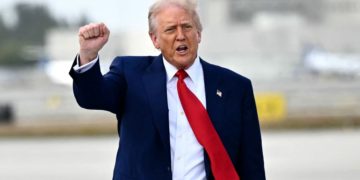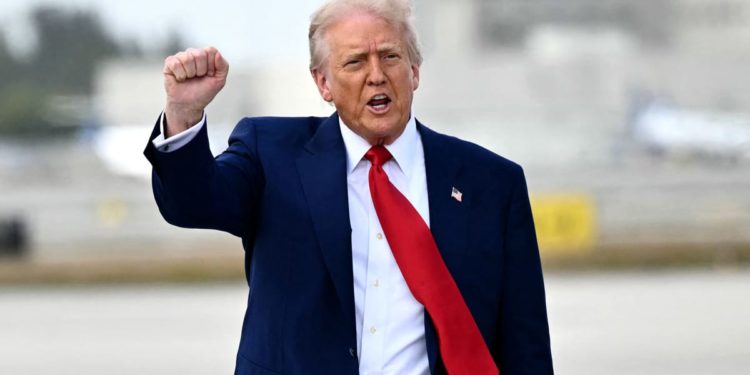President Donald Trump said Monday that the U.S. has started “direct” talks with Iran over its nuclear program, and that his administration would have a meeting with “high level” officials on Saturday.
“I think if the talks aren’t successful with Iran, I think Iran is going to be in great danger,” Trump told reporters in the Oval Office. “And I hate to say it, great danger, because they can’t have a nuclear weapon.”
Trump’s announcement, made sitting beside Israeli Prime Minister Benjamin Netanyahu, comes as Iran has pushed back on direct talks with the U.S. to negotiate its nuclear program. Tehran has not confirmed the Saturday meeting and the Iranian mission to the United Nations didn’t respond to a request for comment.
Trump revealed last month that he sent a letter to Iran’s supreme leader Ayatollah Ali Khamenei, offering direct talks over the country’s nuclear program. Part of the Israeli prime minister’s visit, according to two people briefed on the matter, included a push to get on the same page about military options to deal with Iran’s nuclear sites if Trump’s deal-making skills hit a wall with Tehran. Both individuals were granted anonymity as they weren’t authorized to speak publicly about sensitive internal diplomatic matters.
Netanyahu, sitting beside Trump in a gold flecked chair surrounded by a swarm of cameras and microphones in the White House, gave a similarly veiled warning to Tehran if diplomacy didn’t work.
“If it can be done diplomatically in a full way the way it was done in Libya, I think that would be a good thing,” Netanyahu said. “But whatever happens we have to make sure that Iran does not have nuclear weapons.”
But Trump’s hawkish approach to Iran has sparked a furious debate in the MAGA world about the direction of the new administration’s foreign policy, and whether fresh military entanglements in the Middle East are worth it.
Trump has stacked his administration with prominent Iran hawks, like national security adviser Mike Waltz and Secretary of State Marco Rubio, but also with figures who want the United States to move away from military entanglements in the Middle East. Their clashes have become very acrimonious and very public in recent weeks, and it could affect the U.S. approach to Israel and its pressure campaign on Iran.
Influential voices in the MAGA world outside of government are deeply wary of Trump’s recent threats against Iran.
Now “is the worst possible time for the United States to participate in a military strike on Iran,” conservative commentator Tucker Carlson warned in a post on X on Monday. “Nothing would be more destructive to our country. And yet we’re closer than ever, thanks to unrelenting pressure from neocons. This is suicidal. Anyone advocating for conflict with Iran is not an ally of the United States, but an enemy.”
Iran previously has rejected the prospect of talks with Trump, with Iranian Foreign Affairs Minister Abbas Araghchi over the weekend calling the prospect of direct nuclear negotiations “meaningless.” Iran has asked for indirect diplomacy, questioning Trump’s approach: “If you want negotiations, then what is the point of threatening?” the foreign minister said.
Israeli officials are wary that if Iran eventually agrees to such talks, it could serve to only bide time for Tehran to strengthen its nuclear program. Additionally, it could offer Iran a window of reprieve to recover some of its steep losses from Israeli offensives against Iran’s proxy militant groups in the region. That includes Hamas in Gaza, Hezbollah in Lebanon and the Houthi militants in Yemen.
During Trump’s first term, he withdrew from the Iran nuclear deal he had long criticized, abandoning an agreement that limited Tehran’s nuclear activities in return for sanctions relief.
Now he’ll have to balance new diplomacy with Tehran with the prospect of owning any military consequences if those talks go south.
“Trump would like to avoid two things,” said Aaron David Miller, an expert on U.S. Middle East policy at the Carnegie Endowment for International Peace. “Number one: Iran crossing the nuclear threshold on his watch. And number two, a major military operation by the U.S. or Israel that plunges the region into chaos.”
Iran is continuing to balance on the cusp of nuclear breakout. The U.N. nuclear watchdog reported in February that Iran produced nearly 275 kilograms of uranium enriched to 60 percent — close to the 90 percent threshold for weapons-grade material. A U.S. intelligence assessment publicly released by the Office of the Director of National Intelligence last month said “Khamenei has not reauthorized the nuclear weapons program” but added that “pressure has probably built on him to do so.”
The post Trump says US starting direct talks with Iran appeared first on Politico.


















